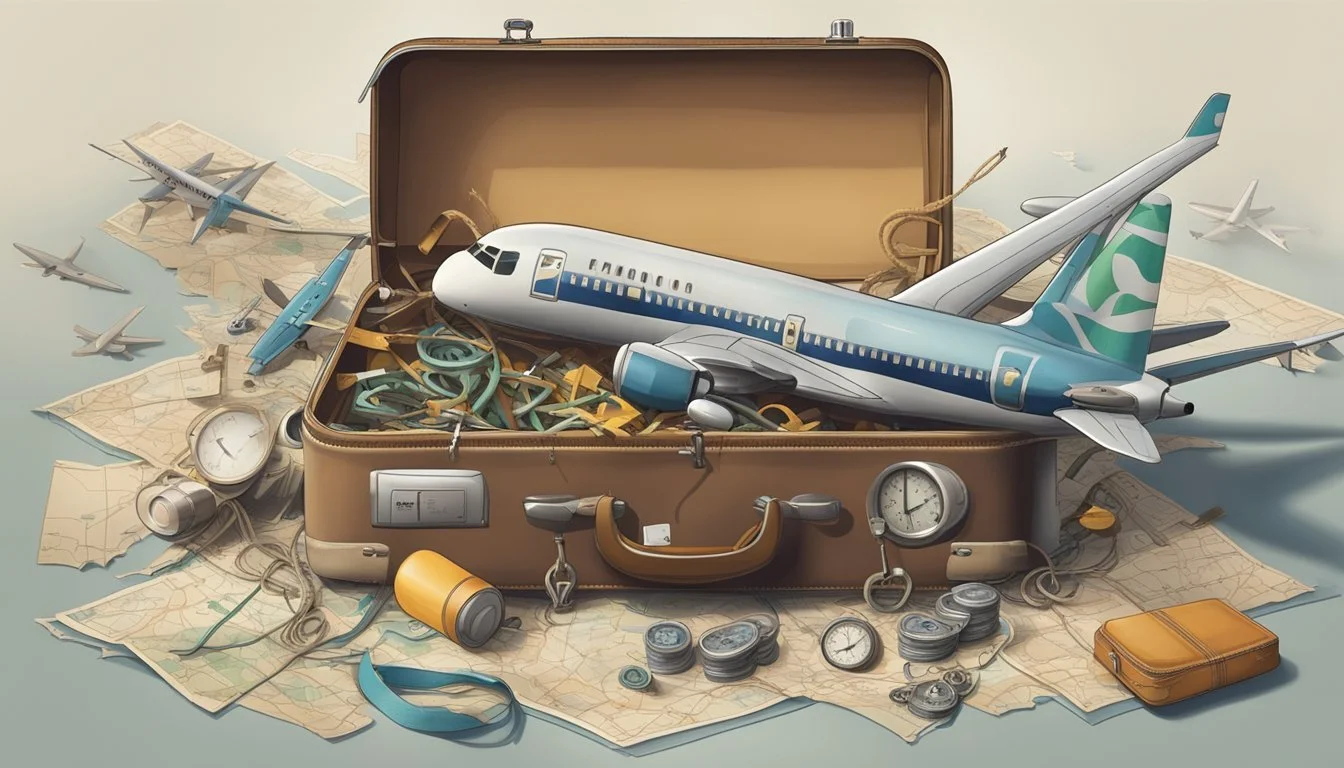7 Ways Trauma Can Impact Your Relationship with Travel
Navigating Emotional Turbulence
Travel can be a transformative experience, offering opportunities for personal growth, new perspectives, and unforgettable memories. Yet, for individuals who have experienced trauma, hitting the road may present unexpected challenges and emotional hurdles. Understanding how trauma intersects with the travel experience is crucial for fostering healthier relationships and smoother journeys.
Awareness of trauma's potential impact can help travelers better prepare and navigate these hurdles, leading to more positive outcomes. By exploring how different facets of trauma influence one's travel experiences and interpersonal interactions, individuals can develop strategies to manage these effects effectively.
1) Triggers Anxiety
Trauma can lead to significant anxiety when it comes to travel. Individuals with trauma might feel heightened stress in unfamiliar environments.
Past experiences may cause a constant state of alertness. This makes it difficult to relax and enjoy the trip.
Triggers like loud noises or crowded spaces can intensify symptoms. This can lead to feelings of being overwhelmed or panicked.
For example, those with a fear of flying might experience severe distress. The uncertainty and lack of control during flights can amplify their anxiety.
These emotional reactions are often linked to the brain's response to trauma. Trauma can alter brain structures, leading to lasting anxiety issues.
Recognizing these triggers is a key step. It helps in managing anxiety and creating coping strategies tailored to individual needs.
Understanding how trauma impacts travel can result in better planning. This ensures a more comfortable and manageable travel experience.
Practices like setting positive intentions for the trip can be beneficial. Engaging in calming activities can also help alleviate stress while traveling.
Knowing what specific triggers exist is crucial. It enables individuals to take proactive steps to reduce anxiety during travel.
2) Erodes Confidence
Experiencing trauma can significantly erode an individual's confidence. This erosion often reflects in their relationship with travel. A person may start to doubt their ability to handle new environments.
Trauma can lead to anxiety and depression, which are well-known for negatively impacting self-esteem. Such mental states may make the prospect of travel feel overwhelming or even unachievable.
Individuals may face heightened fears of the unknown or unfamiliar. This can make travel plans seem daunting and trigger a lack of belief in their capacity to manage travel-related stress.
Sometimes, specific past experiences related to travel may exacerbate this lack of confidence. Situations like being in an accident or experiencing an episode of violence abroad can contribute to this feeling.
For some, even minor travel setbacks can become magnified due to underlying trauma. Instances such as missing a flight or losing luggage can dramatically affect their confidence and reinforce their fears about traveling.
It’s crucial to address these issues by seeking professional help or supportive counseling. Acknowledging these feelings can be the first step toward rebuilding confidence and gradually embracing travel again.
Understanding the link between trauma and self-perception helps in devising coping strategies. This approach can assist in restoring a sense of security and self-assurance when considering travel.
3) Heightens Sensitivity
Trauma can significantly heighten a person's sensitivity to their surroundings and experiences. This increased sensitivity may cause individuals to feel overwhelmed in crowded places like airports. Loud noises, bright lights, or unfamiliar environments might trigger anxiety or stress. These heightened reactions can make traveling a daunting task.
Highly sensitive individuals might also be more attuned to the emotions and behaviors of others. For instance, they might notice tension or discomfort in fellow travelers, causing them additional stress. This can make social interactions and group travel more challenging.
The sensory overload is not limited to just the physical environment. Emotional stimuli, such as perceived rudeness or impatience from travel staff, can also have a stronger impact. These reactions can lead to avoidance behaviors, where the individual may prefer to stay in familiar environments rather than explore new destinations.
Heightened sensitivity can also extend to food, smells, and touch during travel. The sensation of unfamiliar or undesirable food textures, strong perfumes or colognes, and differing hygiene practices can contribute to the overall stress level. Understanding these sensitivities is crucial for making travel a more manageable and enjoyable experience for those affected by trauma.
4) Disrupts Planning
Trauma can significantly disrupt planning, making travel more challenging. Individuals with unprocessed trauma often find it difficult to focus on the future. Their minds can be preoccupied with past events, hindering the ability to make concrete plans.
When trauma triggers anxiety or PTSD, it complicates organizing even simple travel details. People may struggle with booking flights, arranging accommodations, or finalizing itineraries. The fear of the unknown and potential triggers can amplify this difficulty.
Travel planning requires a degree of flexibility and foresight. Trauma survivors often find these qualities hard to muster, leading to procrastination or avoidance. This can result in last-minute arrangements that add stress and reduce overall trip enjoyment.
Additionally, the uncertainty and lack of control over travel-related events can be distressing. Those affected may hesitate to commit to plans, fearing that unexpected situations could trigger emotional responses. This fear of potential triggers can stymie even the simplest travel ambitions.
Overall, trauma's impact on cognitive processes can derail travel plans. Navigating these challenges often requires extra support and understanding, whether from travel companions or mental health professionals.
5) Sparks Avoidance
Trauma can ignite avoidance behaviors, especially related to travel. When someone has experienced significant trauma, they might start to avoid certain places or activities that remind them of the traumatic event. This is particularly common in individuals with Post-Traumatic Stress Disorder (PTSD).
Avoidance behaviors can extend to different aspects of travel. For instance, someone might avoid certain types of transportation, destinations, or even airports if they associate these with their trauma. This can severely limit their ability to enjoy travel and explore new experiences.
In the context of PTSD, avoidance of stimuli is a hallmark symptom. This can include avoiding thoughts, feelings, people, or places that cause distressing memories. While avoidance may offer short-term relief, it often exacerbates trauma symptoms in the long run, creating a cycle of heightened anxiety and restriction.
Emotion-focused therapy suggests that while avoidance may seem useful initially, it can inadvertently reinforce trauma symptoms over time (Avoidance in Trauma). Chronic avoidance can lead to a diminished quality of life, making it hard to fully engage in and enjoy travel experiences.
Understanding that your partner's reactions might be influenced by their trauma is essential. Showing empathy and providing a non-judgmental space can help them feel safer and more willing to address their avoidance behaviors (How Trauma Impacts Relationships).
6) Reduces Enjoyment
Trauma can significantly reduce the enjoyment one derives from travel. Negative past experiences may lead to heightened anxiety or stress, making it difficult to relax in new environments.
Individuals with trauma may struggle to immerse themselves in the cultural and social experiences that travel offers. Their focus often remains on potential threats or discomforts.
Emotional triggers related to past trauma can be easily activated in unfamiliar settings. This can lead to an overall negative experience, overshadowing the trip's potential pleasures.
For those with trauma, even routine travel inconveniences can become overwhelming. Delays, language barriers, and unfamiliar food can exacerbate feelings of helplessness and frustration.
Pre-existing trauma may hinder the ability to form new connections while traveling. The inherent social nature of travel may feel intimidating, leading to isolation rather than enjoyment. These barriers prevent travelers from reaping the full benefits of their journeys and can deter future travel plans.
7) Intensifies Fear
Trauma can significantly amplify a person's sense of fear, particularly in new or unfamiliar environments. This heightened fear can manifest as increased anxiety when planning or embarking on travel.
Individuals might feel unsafe or vulnerable, making it harder to enjoy new experiences or fully immerse themselves in different cultures.
This increased sense of fear can lead to avoidance behaviors. They might choose to stay within familiar surroundings or travel with extra caution.
This can limit their ability to explore and create meaningful connections during their travels.
Being vigilant about travel safety can become an overwhelming preoccupation, reducing spontaneity and joy.
Trauma survivors may struggle with trust when interacting with strangers or navigating unknown territories. This heightened wariness can overshadow the excitement of discovering new places.
For some, the thought of traveling can trigger past traumatic memories. These overwhelming feelings can deter them from taking trips that they might otherwise enjoy.
Understanding and addressing these fears with professional help can be crucial for those affected by trauma. This support can help them regain confidence and rediscover the joy of travel.
Understanding Trauma and Travel
Trauma significantly influences every aspect of life, including travel. Recognizing the impact of trauma on travel can help individuals manage their experiences and challenges more effectively.
Defining Trauma
Trauma is an intense emotional response to distressing events that can lead to long-term psychological effects. These events include incidents like natural disasters, abuse, violence, or accidents. Emotional reactions can manifest as fear, anxiety, or mistrust, deeply affecting a person's well-being.
Individuals who have experienced trauma may develop conditions such as PTSD or anxiety disorders. These conditions can surface unexpectedly. Understanding the nature and effects of trauma is essential for recognizing and addressing its impact on various life aspects.
How Travel Is Affected by Trauma
Travel can be both thrilling and stressful, with stimuli that might trigger trauma-related responses. Individuals with a history of trauma may find certain travel situations particularly challenging. For instance, crowded places or unfamiliar environments might evoke anxiety or panic attacks.
Moreover, the lack of familiar support systems, changes in routine, and the unpredictability of travel can exacerbate feelings of insecurity. Understanding how trauma affects travel can help in planning and coping. Preparations might include being mindful of personal triggers, planning safe and predictable itineraries, and having access to support if needed.
Adopting strategies such as bringing comforting items, keeping a structured plan, and allowing for rest can mitigate the adverse effects of trauma during travel. By addressing these aspects, individuals can create more positive and manageable travel experiences.
Psychological Effects on Travel Perceptions
Trauma can significantly shape how individuals perceive and experience travel. Key impacts include heightened fear, increased avoidance behaviors, and persistent hypervigilance.
Fear and Anxiety
Individuals with trauma often face fear and anxiety when considering travel. Past traumatic events can leave lasting impressions, making new environments feel threatening. Fear of unfamiliar places, crowded areas, or the possibility of experiencing another traumatic event can make traveling daunting.
For example, those who have survived natural disasters may fear flying or being in locations prone to such events. This fear can manifest as physical symptoms, such as sweating, rapid heartbeat, or even panic attacks, severely affecting the travel experience.
Avoidance Behaviors
Trauma can lead to avoidance behaviors related to travel. People may consciously or unconsciously steer clear of places or activities that trigger memories of their trauma. This can include avoiding specific destinations, modes of transportation, or even certain times of the year.
Such behaviors significantly limit travel opportunities and impact quality of life. For instance, survivors of car accidents might avoid road trips altogether, or those who have experienced violence may avoid crowded tourist attractions, hindering their ability to explore and enjoy new experiences.
Hypervigilance
Hypervigilance is another psychological effect that can influence travel perceptions. This state involves being constantly on alert for potential threats, making relaxation during travel difficult. Individuals may meticulously plan every aspect of their trip to minimize risks, leading to exhaustion and reduced enjoyment.
This heightened awareness can manifest as frequent scanning of surroundings, distrust of strangers, or obsessive worry about safety. For example, a person who has experienced violence might feel unsafe in hotel rooms or public spaces, continuously checking locks and exits, which detracts from the pleasure of travel.
Understanding these psychological effects is crucial for addressing the obstacles trauma survivors face in travel contexts.
Healing and Managing Trauma for Better Travel Experiences
Addressing trauma can significantly enhance one's travel experiences by improving mental resilience and emotional stability. This section explores therapeutic approaches, travel planning strategies, and mindfulness techniques to facilitate healing.
Therapeutic Approaches
Individualized care is crucial for managing trauma. Trauma healing retreats offer specialized therapy and activities designed to help individuals with PTSD or similar issues. These retreats provide a supportive environment where trained professionals guide participants through healing processes.
Cognitive Behavioral Therapy (CBT) and Eye Movement Desensitization and Reprocessing (EMDR) are effective treatments. They help in reframing negative thoughts and processing traumatic memories, thereby reducing their impact on daily life.
Group therapy sessions also create a sense of community and shared experience, fostering emotional support.
Travel Planning Strategies
Effective travel planning can reduce anxiety and enhance the experience. Begin by choosing destinations that feel safe and offer a sense of peace. Research the area thoroughly and prepare for potential triggers by having a list of coping mechanisms.
Consider booking a guided tour or travel package, which can provide structure and reduce the stress of planning each detail. Opt for accommodations that prioritize comfort and security, such as reputable hotels or wellness retreats.
Creating a flexible itinerary allows for adjustments if unforeseen anxiety or stress arises, ensuring a more relaxed travel experience.
Mindfulness Techniques
Incorporating mindfulness can significantly aid in managing trauma during travel. Deep breathing exercises help maintain calm in stressful situations, while meditation promotes a centered mind.
Practicing grounding techniques can keep individuals focused on the present moment, reducing anxiety about unfamiliar environments. Carrying a small object with personal significance, like a comfort item, can provide a sense of security.
Engaging in mindful activities such as yoga or nature walks enhances awareness and relaxation. These techniques not only improve travel experiences but also contribute to overall mental well-being.










